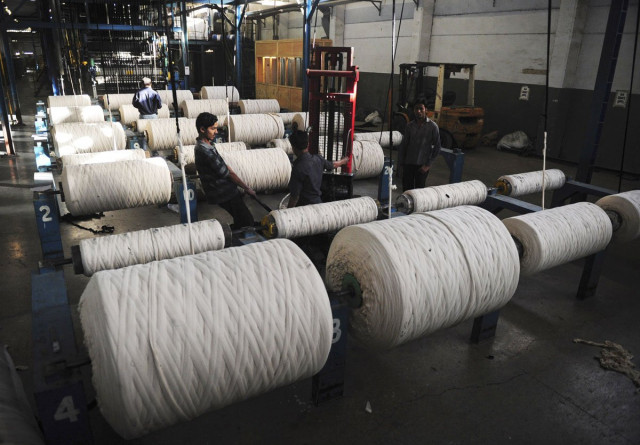The wheel of life: Spinning a new future for the silk labourers of Swat
Industry looks for new life after being crumbled by terrorism, economic policies and a series of unfortunate events.

File photo of textile factory. PHOTO: AFP/FILE
A 77-year-old man can be seen patiently making his way through Mingora bazaar every morning. After saying his prayers, he pushes a cart laden with vegetables up a steep road to the market to begin his sale for the day. This is Abdur Rahman, father to five daughters and three sons.
“I used to work at a silk mill,” said the old man. “I handled three machines for 12 hours every day; and if I worked overtime, I would make about Rs15,000 a month.”
Rahman lives in a three-room mud house in Rahimabad, Mingora. He speaks of his time at the mill with a glint in his eye. Not only did he manage to provide for the whole family, but Rahman says he was able to scrape together a meagre amount of savings as well.
“They were good days,” he says. “Of course, this was before the 2007 insurgency.”
Within the year, Rahman says, their peaceful valleys became a hub of unspeakable violence and shrouded their homes and hearts in darkness. Everyone suffered, and curfews were imposed from 12 hours up to 72 hours consecutively.
“The mill I used to work for, along with many others, shut down by 2008,” said Rahman. “67 of my fellow workers were rendered jobless. Some were lucky enough to find employment elsewhere, while others, such as I, began working daily wage jobs to feed our families.”
Rahman says he worked until he gathered enough money to buy his cherished pushcart. “I used to work with spinning wheels during my time at the mill,” said the old labourer with a hint of irony. “Now I depend on the wheels of this pushcart to keep my life moving.”
“Sometimes, though, this cart fails me,” says Rahman. “Living expenses are increasing every day, and it is very hard to keep up. I pay Rs3,000 rent, over 1,000 for electricity, and then there are the household expenditures. I have had to borrow money as well.”
Once a big business
The silk industry in Swat traces its roots to back when the region was governed as a princely state by the Wali of Swat. During the industry’s post-1976 pinnacle, an astounding 500 silk mills were set up across Swat Valley.
The labourers worked day and night at these mills, Muttahida Labour Union President Meraj Nabi told The Express Tribune.
Over 78,000 labourers from Swat, Buner, Shangla, Dir, Peshawar and Faisalabad were working here before 2000.
“Most of them would easily earn Rs7,000 to Rs10,000 for fifteen days’ work,” said Nabi. “2007 brought with it terrorism and the industry suffered heavily as a result. Many silk mills were located along the main roads and were easy targets.”
The approximately 80 mills that do remain, Nabi added, employ about 2,000 labourers who earn around Rs5,000 for 15 days. He says many have become daily wage labourers and can be found on Mingora’s streets seeking work.
The union’s president claims that neither the district government nor the provincial government has taken any steps for the affected labourers.
The downward spiral
“During the rule of Wali of Swat, silk mills provided employment to thousands of labourers,” said Swat Silk Mill Owner’s Association Chairman Khalid Khan. “A special permit was also issued to us in 1964, whereby we did not have to pay taxes on threads.”
The permit was cancelled in 1996 and tax-free, lower quality threads were provided to the mills through the Afghan transit trade agreement. In 2000, Khalid said, that was also put to an end after transit trade between the two countries was sealed.
After the final blow landed in 2007, machines worth billions from over 400 mills were sold at throwaway prices. The fabric of Swat that was once popular throughout Pakistan and many other countries, Khalid said, is now a fading vestige. The chairman said government and non-governmental organisations alike have shown no support to mill owners.
“Moreover, the government is now planning to impose taxes on mills,” said Khalid. “I can assure you that if this happens, the remaining few mills will also close.”
Mumtaz, a silk mill owner, said Swat was an industrial zone up until 2000 because of the burgeoning transit trade between Pakistan and Afghanistan. “When that trade was sealed in 2000, the price of cotton increased, silk mills lost their importance and terrorism came knocking at our door.”
After 2007, bomb blasts, suicide attacks and mortar shells damaged the building and machinery of numerous silk mills in Kabal, Matta and Mingora. Mumtaz claims that no relief was given to mill owners such as himself, even after ‘peace’ was restored in Swat.
“I had 90 labourers working in my mill, which functioned 24 hours,” said Mumtaz. “The little that is left now is also hard to manage due to excessive load-shedding, which hardly lets my machines operate for more than five hours a day.”
A labour department inspector in Swat, Ghani Razzaq, however, claims that there are organisations working for the labourers. Unluckily, he adds, the labourers do not come forward with their plight to avail these facilities.
“A record of labourers is available with the labour department and social security cards have been provided to them,” said Razzaq. “With these cards, they can avail medical and educational facilities for themselves and their families.”
However, the unemployed labourers seem to be adamantly optimistic about the future of silk mills in their valleys. Many express hope that the government will bring its focus to the crumbled industry and revive it.
Published in The Express Tribune, June 3rd, 2014.













COMMENTS
Comments are moderated and generally will be posted if they are on-topic and not abusive.
For more information, please see our Comments FAQ